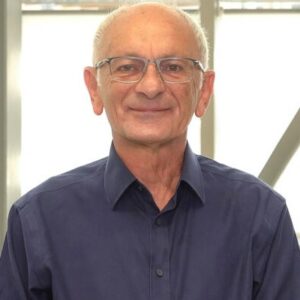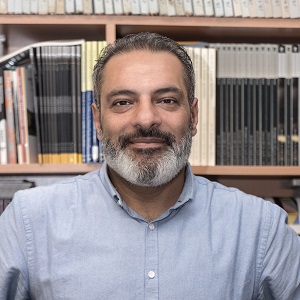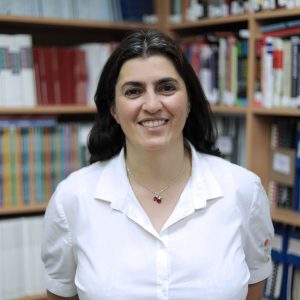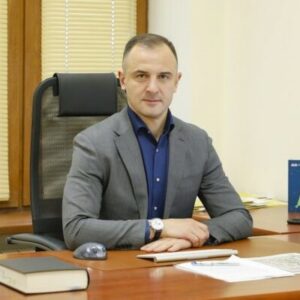
Along with his training in the history and politics of the Modern Caucasus, Armenia, and the Middle East, he received substantial training in both France and the US in diplomatic history, political psychology (as it pertains to leaders, decision-making, and international relations more broadly), crisis management, and conflict resolution. Over the past decades, he has taught over twenty different courses, including half a dozen doctoral seminars, at the following universities: California State University, Long Beach; the University of Michigan, Ann Arbor; UCLA; and the University of California, Berkeley. He joins AUA after retiring from the latter, where he taught for nearly twenty-five years and held a dual position as the William Saroyan Director of the Armenian Studies Program and an Associate Adjunct Professor in the Department of History. While at Berkeley, he hosted numerous scholars including from Armenia through the Fulbright program, among others. He also mentored half a dozen or more foreign doctoral students who came to Berkeley through exchange programs to carry out research into contemporary Armenia or the post-Soviet Caucasus.
He has served and/or continues to serve on several boards and editorial committees:
-the Executive Committee of the Institute of Slavic, East European, and Eurasian Studies (U.C. Berkeley), 2011-July 2022.
-the Board of Directors of the American Research Institute of the South Caucasus (ARISC), 2010-July 2022.
-the Prize-Awarding Jury of the President of the Republic of Armenia that nominates “Individuals Having Made a Significant Contribution to the Recognition of the Armenian Genocide” since March 2007. The prize was suspended in 2021, 2022, and 2023 because of the pandemic and the Karabagh War.
-the selection committee of the Dolores Zohrab Liebmann Fund.
-the Advisory Board of Armenians in the Modern and Early Modern World book series published by I.B. Tauris (Bloomsbury Publishing) since 2020.
-the Editorial Board of the Journal for the Society of Armenian Studies since March 2018.
-the Academic Board of the Zoryan Institute since 2004.
-the Editorial Board of the Armenian Review since 2003.
Astourian has peer-reviewed various projects and publications. Some of the organizations and academic presses/journals follow.
Organizations
-the Israel Science Foundation (multi-year project)
-the Standard Research Grants program of the Social Sciences and Humanities Research
Council of Canada (SSHRC)
-the American Councils for International Education (Title VIII)
-the State Committee of Science, Ministry of Education and Science of the Republic of Armenia
-InterMedia, a global research-based consultancy
Presses and Journals
-the “New Directions in Turkish Studies” book series published by Berghahn Books.
-Publications de l’Institut des hautes études internationales et du développement (Geneva)
-Edinburgh University Press
-History and Memory
-Journal of Historical Sociology
–Comparative Studies in Society and History
–Études arméniennes contemporaines (Paris).
–Nationalities Papers
–International Political Sociology
–Journal of the Society for Armenian Studies
–Nations and Nationalism
–Holocaust and Genocide Studies
–Revue d’histoire arménienne contemporaine
-Armenian Review
Education
Ph.D., University of California, Los Angeles (UCLA).
Doctoral Exams, UCLA (with distinction).
MA, UCLA.
Diplôme d’Etudes Approfondies, University of Paris I (Sorbonne), summa cum laude.
Certificate (Classical Armenian), Institut Catholique (Paris).
Maîtrise, University of Paris I (Sorbonne), summa cum laude.
Licence, University of Paris I (Sorbonne).
Diplôme d’études universitaires générales, Lycée Henri IV (Paris), Classes préparatoires à l’Ecole Normale Supérieure (Admissible).
Office location
423M Main Building
Email
[email protected]
Phone
(+374 60) 61 2673
Office hours
Mondays: 2 :45 pm-3:45 pm
Thursdays: 5 :15 pm-6 :15 pm
And by appointment or via Skype
Areas of research and teaching specialization
Modern Armenian and Caucasian History and post-Soviet Politics; Genocides and Ethnic Conflicts; Diasporas; Late Ottoman Empire and Modern Turkey.
Foreign Policy Analysis; Foreign Policy and Strategic Planning; Political Psychology in International Relations; Diplomatic History; Intelligence as a Field of Historical Studies.
Courses currently taught
- IRD 301: Foundations of International Relations.
Publications
–Editorship of Books:
- Stephan H. Astourian and Raymond H. Kévorkian, eds, Collective and State Violence, Homogenization and Construction of National Identity in Turkey. New York and Oxford: Berghahn Books, November 2020. (578 pages)
- MemorIkon. Los Angeles: Arvest Publishing, 1997. (Art Book)
–Editorship of a journal:
- Jusur: The UCLA Journal of Middle Eastern Studies 6 (October 1990): 1-134.
- Jusur: The UCLA Journal of Middle Eastern Studies 5 (October 1989): 1-118.
–Editorship of Occasional Papers and Armenian Studies Conference Proceedings:
- Stephan H. Astourian, ed., Armenia’s Foreign Policy: Some Perspectives, Occasional Paper of the Armenian Studies Program at U.C. Berkeley, No. 2. (May 2016).
- James R. Russell, “The Book of the Way (Girk` Chanaparhi) of Yeghishe Charents: An Illuminated Apocalyptic Gospel for Soviet Armenia,” ed. Stephan H. Astourian. Occasional Papers of the Armenian Studies Program at U.C. Berkeley, No. 1, (Spring 2012).
–Articles and Book Chapters
Nineteen peer-reviewed articles and book chapters published in France, Great Britain, and the U.S., some translated and republished in Frace and Turkey, and ten or so other articles or essays.
–Selected peer-reviewed articles and book chapters:
- “Afterword: Shapes, Legitimation, and Legacies of Violence in the Ottoman Empire and Turkey,” Collective and State Violence, Homogenization, and Construction of National Identity in Turkey (sponsored by the Zoryan Institute), edited by Stephan H. Astourian and Raymond H. Kévorkian, 525-567. New York and Oxford: Berghahn Books, 2020.
- “Reflections on the Ottoman Historiography (1960s-1990s) about the Role of Non-Muslims and Armenian Ottomans in Trade and the Urban Economy.” In Le génocide des Arméniens : Cent ans de recherche (1915-2015), edited by the Conseil scientifique international pour l’étude du génocide des Arméniens (Becker, Annette; Bozarslan, Hamit; Duclert, Vincent; Kévorkian, Raymond; et. al.), 224-48, 350-56. Paris: Armand Colin, 2015.
- “The Silence of the Land: Agrarian Relations, Power, and Ethnicity in Late Ottoman Turkey.” In A Question of Genocide: 1915: Armenians and Turks at the End of the Ottoman Empire, edited by Ronald Grigor Suny, Fatma Müge Göçek, and Norman M. Naimark, 55-81, 328-39. Oxford: Oxford University Press, 2011.
- “Armenian Demography, the Homeland, and the Diaspora: Trends and Consequences.” In Arméniens et Grecs en diaspora: approches comparatives, edited by Bruneau Michel, Ioannis Hassiotis, Martine Hovanessian, and Claire Mouradian, 191-210. Athens: École française d’Athènes, 2007.
- “State, Homeland, and Diaspora: The Armenian and Azerbaijani Cases.” In Currents, Cross-Currents and Conflict: Transnationalism and Conflict in the Caucasus and Central Asia, edited by Touraj Atabaki and Sanjyot Mehendale, 80-112 London: Routledge, 2005.
- “Le Génocide arménien: massacre à l’asiatique ou effet de modernité ?” In Quand tombe la nuit: Origines et émergence des régimes totalitaires en Europe, edited by Stéphane Courtois, 63-77, 364-69. Lausanne: L’Age d’Homme, 2001.
- “The Nagorno-Karabakh Conflict: Dimensions, Lessons, and Prospects,” Mediterranean Quarterly 5, 4 (Fall 1994): 85-109.
- “In Search of their Forefathers: National Identity and the Historiography and Politics of Armenian and Azerbaijani Ethnogeneses.” In Nationalism and History: The Politics of Nation Building in Post-Soviet Armenia, Azerbaijan and Georgia, edited by Donald V. Schwartz and Razmik Panossian, 41-94. Toronto: University of Toronto Centre for Russian and East European Studies, 1994.
- “The Sykes-Picot Agreement Revisited: Behavioral Models and Diplomatic History,” Jusûr: The UCLA Journal of Middle Eastern Studies 3 (September 1987): 1-36. Received the James E. Phillips Award for best article published in UCLA’s more than twenty peer-reviewed academic journals.

Arthur Drampian is Adjunct Senior Lecturer at the College of Humanities and Social Sciences. He has been affiliated with AUA since 1998. Dr. Drampian’s primary areas of interest are decentralization and local governance, public finance and budgeting, local economic development, environmental policy, public participation in government decision-making. Arthur Drampian holds PhD degree in Biology from Moscow State University (1987) and Master’s degree in Sustainable International Development from Brandeis University, Massachusetts (1997). Dr. Drampian’s publications on municipal finance and local government issues were published in Armenia and foreign journals.
Education, Degree
MA, Brandeis University
PhD, Moscow State University
Office location
108W, Paramaz Avedisian Building
Email
[email protected]
Office hours
Saturday, 11-12 am
Areas of research and teaching specialization
Public finance, local governance, intergovernmental finance, decentralization policy, environmental science and policy, development policy and practice, sustainable development
Courses currently taught
Grad:
- Public Finance and Budgeting
- Environmental Science

Brian A. Ellison is Dean of the College of Humanities and Social Sciences and Professor of Political Science at the American University of Armenia. He previously served as Director of the Martin School and founding Chair of the Department of Politics and Philosophy at the University of Idaho, as Chair of the Department of Government and Justice Studies at Appalachian State University, and as Director of Master of Public Administration programs at the University of Idaho, the College of Charleston, and Missouri State University. Professor Ellison has served as a visiting professor at the University of Political Science and Law and at Liaoning Normal University in China, as a Fulbright Senior Scholar in Bulgaria, Fulbright Hayes Scholar in Bulgaria and Turkey, as visiting Professor of International Relations at St. Petersburg State University in Russia, and as a higher education consultant for the Open Society to Yerevan State University in Armenia. Dr. Ellison’s research focuses on public administration, local government, and economic development and has appeared in journals and edited volumes, including Policy Studies Journal, Natural Resources Journal, Administration and Society, International Journal of Public Administration, State and Local Government Review, Environmental Management, Publius: The Journal of Federalism, Policy Studies Review, American Review of Public Administration, Public Administration Review, and others. Professor Ellison received his PhD in environmental politics and policy from Colorado State University, and Master of Public Administration, Master of Arts in American Studies, and Bachelor of Science in psychology from the University of Wyoming.
Education
Ph.D., Colorado State University
Office location
MB Room 504M
Email
[email protected]
Phone
(+374 60) 61 2503
Office hours
By appointment
Areas of research and teaching specialization
Economic Development, Local Government Administration, Environmental Politics
Courses currently taught
Ugrad:
- Public Administration
- Introduction to US Government
- Development Policy
Grad:
- Development Policy and Strategy
- Economics for Political Science

Vache Gabrielyan specializes in public administration and economics. He studied at the Yerevan State University and received his Doctor of Philosophy in Public Administration from Rutgers University. He has served as Vice-Governor of the Central Bank of Armenia (2008-2010), Minister of Finance (2010-2012), Minister-Chief of Government Staff (2013-2014), Chief Advisor to the Prime Minister (May – November 2014), as well as the Deputy Prime Minister of Armenia, and the Minister of International Economic Integration and Reforms (2014-2018). Effective January, 2019 Dr. Vache Gabrielyan has been appointed as Dean of the Manoogian Simone College of Business and Economics (CBE). Dr. Vache Gabrielyan is the author of a number of scientific papers published in Armenia and abroad.
Education
PhD, Rutgers University
Areas of research and teaching specialization
Public Administration, Public Policy, Research Methods
Courses currently taught:
PA 340 Introduction to Public Administration
Selected Publications
Books and Symposia:
- Red Tape from Red Square: Bureaucratic Commentary in Soviet Graphic Satirical Art, with Marc Holzer, Iryna Illiash and Lyudmila Kuznetsova, National Sector for Public Productivity, 2010.
- “Bureaucracy on the Silver Screen: A World-Wide Perspective.” Co-editor: Marc Holzer, Public Voices, Vol. 4, No. 2 (2000).
- “Post-Soviet Bureaucracy: Change and Continuity,” Co-editor: Marc Holzer, special issue of the International Journal of Public Administration, Vol. 22, No. 1, 1999.
Articles (Peer Reviewed Journals):
- “Discourse in Comparative Policy Analysis: Privatization Policies in Britain, Russia and the United States,” Policy and Society, Vol. 25, No. 2, 2006, pp. 47-75.
- “The Origins and Transformation of Policy Ideas: Case study: Education Law of Armenia’, with Gayane Selimyan, NISPAcee Occassional Papers,Volume IV – No. 3 Summer 2003.
- “Investing in Corporate Securities: Prospects in Armenia,” with Gnel Sahakyan, Information Technologies and Management, No. 2, 2002, pp. 212-225 (in Armenian).
- “The Rise and Fall of Soviet Screen Bureaucrat,” Public Voices, 2000. Vol. 4, No. 2, Spring 2000, pp. 61-72.
- “Post-Communist Bureaucracies: Organizational Modes of Transition,” International Journal of Public Administration, Vol. 22, No. 1, 1999, pp. 69-99.
- “Public Administration in Ancient China: Practice and Theory,” Public Voices, Vol. 2, No. 1, Spring 1996, pp. 25-44.
Chapters and Book articles:
- “Challenges of Economics and Armenian Economy,” in Yerevan State University Department of Economics Yearbook, Yerevan: YSU Publishing, 2013, pp. 5-11 (in Armenian).
- “Introduction” and “Government Regulation of Banking,” in Asatryan, Bagrat (ed.) Banking, Second edition, Yerevan: Gir Publishers, 2013, pp. 16-22 and 443-458 (in Armenian).
- Vache Gabrielyan and Gayane Selimyan, “Public Management Reforms: Armenia,” in Bouckaert Geert, Nemec Juraj, Nakrosis Vitalis, Hajnal Gyorgy, Tonnisson Kristiina (Eds.) Public Management Reforms in Central and Eastern Europe. NISPAcee Press, Bratislava, 2009, pp. 27-50.
- “Qualitative Research Methods: An Overview,” with Kaifeng Yang and Susan Spice, in Gerald J. Miller and Kaifeng Yang (eds.). Handbook of Research Methods in Public Administration, New York: Second edition, New York: CRC Press, 2007, pp. 141-171.
- “Five Great Ideas of American Public Administration,” with Marc Holzer, and Kaifeng Yang in Rabin, Jack, Hildreth, W. B. and Gerald J. Miller (eds.). Handbook of Public Administration, Third edition, New York: CRC Press, 2007, pp. 49-103.
- “Comparative and International Administration,” with George M. Guess, in Rabin, Jack et al. (eds.), Handbook of Public Administration, Third edition, New York: CRC Press, 2007, pp. 565-605.
- “Capital Account Liberalization Experiences in Armenia,” with Armine Khachatryan, in Bakker, Age F.P. and Bryan Chapple (eds). Capital Liberalization in Transition Countries: Lessons from the Past and for the Future. Cheltenham: Edward Elgar, 2003.
- International Encyclopedia of Public Policy and Administration. Jay Shafritz, Editor-in-Chief. Harper-Collins/Westview Press. 1998. Author/co-author of the following entries:“Outsourcing,” pp. 1590-1596.
“Cost-Effectiveness Analysis,” pp. 563-566. - “Reforming Eastern European Bureaucracy: Does American Experience Apply?” with Frank Fischer, in Asmerom, Haile K. and Reis E. (eds.) Democratization and Bureaucratic Neutrality: Experience From Developed and Third World; London: MacMillan; New York: St. Martin’s Press, 1996, pp. 109-127.
Email
[email protected]
Phone
(+374 60) 61 26 10
Office location
222W (PAB)
Office hours
By appointment

Since 2020 Dr. Arsen Gasparyan has been teaching a number of courses in the fields of International Relations and International Political Economy at the American University of Armenia. From 2014 to 2018 Dr. Gasparyan was involved in teaching and research activities at Miami-Dade College and University of Miami (Florida, USA).
Dr. Arsen Gasparyan served as a Senior Adviser to the Prime Minister of Armenia (2018-2019). He has an extensive background in the field of diplomacy, including high-ranking diplomatic positions in the Ministry of Foreign Affairs of Armenia. From 1993 until 1999 Arsen Gasparyan was a member of the Armenian official delegation to the Nagorno-Karabakh peace process.
Arsen Gasparyan holds a Ph.D. in Political Science from the University of Miami, and his dissertation concerned Energy Diplomacy: The United States of America and the Russian Federation. He has various publications in American, European, Russian, and Armenian periodicals and media.
Dr. Gasparyan is a Converse Bank Board Member since September 1st, 2022.
Education
PhD, International Studies Department, University of Miami, Coral Gables, Florida
Candidate of Political Science, Institute of Philosophy and Law of the National Academy of Science of Armenia and Yerevan State University
BS, Middle Eastern Studies Department, Yerevan State University
Areas of Research and Teaching Specialization
International Relations Theory, International Political Economy, American Politics, Russia and the post-Soviet space, ethnic conflict, and energy (oil and natural gas).
Teaching courses
Ugrad:
- Religion & Politics
- International Relations
- Survey of Regional Politics
- Introduction to U.S. Government
Grad:
- Graduate Seminar on Globalization
- International Political Economy
- Country Risk Analysis
Recent publications
“The Role of Energy in Russian Foreign Policy” in Roger E. Kanet and Dina Moulioukova ed. Russia and the World in the Putin Era: From Theory to Reality in Russian Global Strategy. London-New York: Routledge 2021.
“Understanding the Nagorno-Karabakh Conflict: Domestic Politics and Twenty-Five Years of Fruitless Negotiations 1994-2018.” Caucasus Survey. Volume 7. Issue 3. 2019.

Asbed Kotchikian joined AUA after a twelve-year of teaching at the Global Studies Department at Bentley University. Before joining Bentley University he was the Assistant Director of International Affairs Program and assistant professor of Political Science at Florida State University. Between 2000 and 2002, Dr. Kotchikian was a visiting professor in Armenia teaching at Yerevan State University, Brusov State University of Languages and Social Sciences and the Gyumri branch of Armenian State University of Economics. For nine years (2008-17) he was the editor-in-chief of the peer-reviewed Armenian Review journal. Between 2011 and 2019 Dr. Kotchikian was the academic coordinator of Armenia Higher Education Initiative (AHEI) which organized summer courses in social sciences and humanities methodology retraining for graduate students in Armenia focusing on students from universities outside of Yerevan. During the last 20 years, Dr. Kotchikian has traveled extensively in the Middle East (Iran, Iraq, Israel, Jordan, Lebanon, Syria, and Turkey) and former Soviet Union (Armenia, Azerbaijan, The Baltics, Belarus, Georgia, Russia, and Ukraine). He has written, lectured, presented, and organized conferences on foreign policies of small and weak states, questions of identity and diasporas, and regional developments in the Middle East and Eurasia. In recent years his research on minorities has taken him to Iraq (Kurdistan in 2015) and Syria (2014 and 2019). Apart from his academic/scholarly research, he is also a freelance consultant on de-radicalization, civil society and judicial reforms working with organizations such as Council of Europe and the European Union on projects in Armenia, Belarus, Georgia and Ukraine. Dr. Kotchikian received his undergraduate degree in Political Science and Public Administration from the American University of Beirut (AUB) after which he continued his graduate studies at Boston University obtaining his PhD in 2008 (with a dissertation work on the foreign policy of small states focusing on Georgia and Armenia).
Education
PhD. Boston University
BA American University of Beirut
Areas of Research and Teaching Specialization
Foreign policy making, diasporas, small states in the international system, terrorism, governments and politics in the Middle East and Eurasia.
Courses:
Ugrad courses:
Comparative Politics
Comparative Politics
Political Ideologies
Grad courses:
International Organizations & Global Governance
Russian Politics
Middle East Politics

Hovhannes Nikoghosyan specializes in global order and international security, and has keen interest and research experience in human rights and armed conflicts, international criminal responsibility for erga omnes crimes, as well as Responsibility to Protect. He is a graduate of the Russian-Armenian (Slavonic) University with MA in International Relations and PhD in Political Science (2011). Before joining AUA in January 2015, he worked as a Visiting Fellow at the Center for Strategic and International Studies (Washington DC), Magdalena Yesil Visiting Scholar at Sanford School of Public Policy, Duke University (Durham, NC) and has completed an Advanced Certificate Program at the Fletcher School of Law and Diplomacy, Tufts University (Medford, MA). Between May 2017 and April 2018 he served as Aide to the President of the Republic of Armenia. Dr. Nikoghosyan is author of a number of peer-reviewed papers and expert reports published in Armenia and abroad.
Education, Degree
PhD, Russian-Armenian (Slavonic) University (2011)
Visiting Scholar, Duke University (2012-13)
Advanced Certificate Program in Public Administration, Fletcher School of Law and Diplomacy, Tufts University (2014)
Office location
108W, Paramaz Avedisian Building
Email
[email protected]
Office hours
Weds, 10-11am, by appointment
Areas of research and teaching specialization
Human rights in armed conflicts, international security, strategic communications, Responsibility to Protect
Teaching Courses
Ugrad:
- Introduction to Political Science
Grad:
- Research Methods in International Relations
- International Conflicts and Human Rights
- International Relations
- International Conflicts in XXI Century
- Foreign Policy Analysis
- Government, Politics and the Media
Research Activities/Projects
“Foreign policy-making in parliamentary republics: The case of the Republic of Armenia” – AUA Faculty Research Grant (2016-17)
Selected publications
- Hovhannes Nikoghosyan & Vahram Ter-Matevosyan (2022): From ‘revolution’ to war: deciphering Armenia’s populist foreign policy-making process, Southeast European and Black Sea Studies, DOI: 10.1080/14683857.2022.2111111
- Nikoghosyan, (2022). Black garden aflame: the Nagorno-Karabakh conflict in the Soviet and Russian Press. in Southeast European and Black Sea Studies (pp. 1–3). Informa UK Limited. https://doi.org/10.1080/14683857.2022.2095696 [Book review]
- Armen Gevorgyan, Hovhannes Nikoghosyan (2022). Weaponizing religion and potential consequences for European democratic security. Research Report presented to the Parliamentary Assembly of the Council of Europe (36 pages)
- “Great Power Interventions and the Future of Responsibility to Protect”, Valdai Paper #74, August 2017.
- “Armenia after 25 years of Independence: Maintaining Stability in an Unpredictable Neighborhood”, Russian International Affairs Council, December 2016 (book chapter). (Available in AUA Library)
- “Government failure, atrocity crimes and the role of the International Criminal Court: why not Syria, but Libya”, The International Journal of Human Rights, Published online: 30 Sep 2015. DOI:10.1080/13642987.2015.1082838
- “Global problems for global governance”, Valdai Club Report Series, September 2014. (co-authored)
- The Upheavals in Libya and Syria, and Their Impact on “Responsibility to Protect” Doctrine, Turkish Policy Quarterly, Volume 12(1), Spring 2013.
- How to move forward in Nagorno Karabakh after the Four Day War, ELIAMEP Briefing Notes 48/ 2016.

Yevgenya Jenny Paturyan specializes and has interest in the sphere of civil society, political culture, volunteering, democratization of post-communist countries, research methodology and corruption. She received her PhD in Political Science from Jacobs University Bremen. Prior to joining AUA, she worked at Eurasia Partnership foundation and at Caucasus Research Resource Centers – Armenia. She is the team leader of a four-year research project about Armenian civil society and has authored publications in peer-reviewed journals. Dr. Jenny Paturyan is an AUA PSIA alumna.
Education, Degree
PhD, Jacobs University Bremen
Office location
123W, Paramaz Avedisian Building
Email
[email protected]
Phone
(+374 60) 61 26 75
Office hours
Varies depending on teaching schedule. Also by appointment.
Areas of research and teaching specialization
Democracy and Democratization, Civil Society, Corruption, Research Methodology
Courses taught at AUA
Ugrad:
- Introduction to Political Science
- Introduction to Political Inquiry
- Political Ideologies
Grad:
- Research Methods in Political Science
- Public Policy Analysis
- Civil Society and Social Capital
- Comparative Politics
Research Activities/Projects
- “Armenian Civil Society after 20 Years of Transition: Still Post-Communist?”
- “Civic Activism as a Novel Component of Armenian Civil Society: New Energy and Tensions”
Publications
- Armenian Civil Society: Old Problems, New Energy After Two Decades of Independence. Springer International Publishing, 2021 (co-author: Valentina Gevorgyan)
- “Re-emerging Civic Activism: Restoring the Ecosystem of Armenian Civil Society” in Civil Society in the Global South, ed. Palash Kamruzzaman, London and New York, Routledge, 2018, 54-70 (coauthor V. Gevorgyan).
- “Armenian Civil Society: It is Not All About NGOs.” Caucasus Analytical Digest 73: 2-5, 2015.
- “Is ‘Googling’ a Technique? What the Internet Can Tell Us about the Non-Governmental Sector in Armenia.” Haigazian Armenological Review 34 (July): 257–67, 2014. (coauthors Valentina Gevorgyan, and Mariam Matevosyan).
- “Trust towards NGOs and Volunteering in South Caucasus: Civil Society Moving Away from Post-Communism?” Southeast European and Black Sea Studies 14 (2): 239-62, 2014 (coauthor V. Gevorgyan).
- “(Dis)Trusting People and Political Institutions in Armenia.” Caucasus Analytical Digest 31: 6-10, 2011.
- Civil Society and Democracy: Disentangling Mutual Influences. VDM Verlag Dr. Müller: Saarbrücken, 2011.
- “Perceptions of Corruption in Armenia: Growing Disappointment and Detachment?” In Adam Hug (ed) Spotlight on Armenia. London: The Foreign Policy Centre. Pp 29-35, 2011 (coauthor Jrbashyan Nairuhi).

Laura Prokić holds a Master of Public Administration with a focus in Global Leadership and Management from Portland State University and a Bachelor of Arts in Anthropology from Willamette University. She currently holds the position of Lecturer in the BA Politics and Governance and Master of Public Affairs programs at the American University of Armenia (AUA). She teaches courses in research methods, research design, political sociology, cultural anthropology, and gender studies. She also serves as the University’s Diversity, Equity, and Inclusion Coordinator and Chair of the Faculty Senate. Her research interests include social science research methods, equitable public leadership, change management, organizational theory, inclusive and participatory policymaking, and public administration reform in transitioning democracies, with a special emphasis on inclusion for women and youth.
Education, Degree
BA Cultural Anthropology, Willamette University
MPA with specialization in Global Leadership and Management, Portland State University
Office location
137W, Paramaz Avedisian Building
Office phone
(+374 60) 61 2582
Email
[email protected]
Office hours
Varies depending on teaching schedule. Also by appointment.
Areas of research and teaching specialization
Social science research methods, public and community leadership, gender and cultural studies, equity in public organizations, public administration reform
Courses currently taught
Ugrad:
- Political Sociology
- Introduction to Political Inquiry
- Methods of Political Inquiry
- Introduction to Cultural Anthropology
- Gender Perspectives
Grad:
- Research Methods
- Research Design
Publications
Lyons, Laura (2018). “The ‘Necessary Evil’: State and Non-State Sector Interactions in Cuba and Effects on Public Services,” Hatfield Graduate Journal of Public Affairs: Vol. 3: Iss. 1, Article 3. https://pdxscholar.library.pdx.edu/hgjpa/vol3/iss1/3/
Prokic, L., Paturyan, Y., Simonyan, L., and Geghamyan, G. (Forthcoming). Taking Advice or “Sticking to Their Guns?”: Future Policy Makers’ Consideration of Expert Advice in Policy Scenario Exercises. PERITIA.

Uroš Prokić specializes in acculturation models, autonomy policy, and issues of national identity in the ex-Yugoslav context. He is particularly interested in the manner in which institutions steer national groups’ attitudes and behaviors. He also focuses on normative issues related to governance and public administration. Dr. Prokic received two BA degrees in Philosophy and Religion from the American Public University, and an MA degree in International Studies from the University of Sydney. He holds a Ph.D. in Public Affairs and Policy from Portland State University (Oregon). Uroš Prokić was previously a researcher and political science lecturer in the Mark O. Hatfield School of Government at Portland State University, teaching classes in Theories of Comparative Politics, War and Morality, Nationalism, International Politics, International Organizations, and European Politics. His expertise lies in the cross-section between political theory, comparative politics, and international relations.
Education
Ph.D., Portland State University (Oregon), USA
MA, University of Sydney, Australia
BA, American Public University, USA
Office location
135W, Paramaz Avedisian Building
Email
[email protected]
Phone
(+374 60) 61 26 72
Office hours
Thursdays: 12:00-14:00
Wednesdays: 17:00-18:30
Areas of research and teaching specialization
Acculturation models, Minority nationalism, Autonomy policy, Development in ex-Yugoslav space
Courses currently taught
Ugrad:
- Introduction to Politics & Governance
Grad:
- Public Policy Analysis
- Development Policy & Strategy
- Economics for Political Science
Publications:
Recent publications include “How Has Religiosity Influenced the Restrictiveness of Marriage Immigration Policy in Serbia, Denmark, and the United States?” (Hatfield Graduate Journal of Public Affairs) and a book review of Marko Grdešić’s text entitled “The Shape of Populism: Serbia before the Dissolution of Yugoslavia” (Journal Southeastern Europe).

Education
Dr. Philosophy (History), University of Bergen, Norway
Candidate of Historical Sciences, Institute of Oriental Studies, NAS, Yerevan
MA, Lund University, Sweden
BA, Yerevan State University, Armenia
Office location
105W, Paramaz Avedisian Building
Email
[email protected]
Phone
(+374 60) 61 26 70
Office hours
Mondays 12:00-1:00 pm
Areas of research and teaching specialization
Turkish domestic and foreign policy, Regional Security, Conflicts in the post-Soviet Space
Courses taught at AUA:
Ugrad:
- Survey of Regional Politics
Grad:
- Caucasus Regional Politics
- Security Policy
- Armenian Politics
- Middle East Politics
Research Database IDs
ORCID: 0000-0002-2212-0391
SCOPUS Author ID: 36599336300
Researcher ID-N-4267-2017
Research Activities/Projects
- SCOPE – “Religion and soft power: Religious Communities in the South Caucasus as Objects of External Influences”
- NUPI – “Research Beyond the Ivory Tower: Policy and Communication Training for University Teams”
Selected Publications
Monographs
- Komünizm Gözünden Kemalizm: Türkiye’nin Dönüşümüne Sovyet Yaklaşımları. Istanbul. İletişim. 2023.
- “Turkey, Kemalism, and the Soviet Union: Problems of Modernization, Ideology and Interpretation”, New York & London. Palgrave Macmillan. 2019.
Reviewed in:- Sakarya, Sumeyye. (2021). Turkey, Kemalism and the Soviet Union: Problems of Modernization, Ideology and Interpretation, written by Vahram Ter-Matevosyan, The Soviet and Post-Soviet Review (published online ahead of print 2021).
- Hryhorii Mavrov. (2021) Turkey, Kemalism and the Soviet Union: Problems of Modernization, Ideology and Interpretation, written by Vahram Ter-Matevosyan, Insight Turkey, vol. 23, no. 1. pp. 252-254
- Mohammed Alrmizan (2020) Turkey, Kemalism and the Soviet Union: Problems of Modernization, Ideology and Interpretation, written by Vahram Ter-Matevosyan, Turkish Studies, vol. 21, 2020, pp. 817-819.
- Sahakyan, Naira (2019) Review of Turkey, Kemalism, and the Soviet Union: Problems of Modernization, Ideology and Interpretation, by Vahram Ter-Matevosyan. Ab Imperio, vol. 2019 no. 4, pp. 214-219.
- “Islam in the Social and Political life of Turkey (1970-2001)”. Yerevan. Limush Press. 2008
Chapters in Edited Volumes
- Ter-Matevosyan V., Mkrtchyan N. (2021) The Conduct of Armenian Foreign Policy: Limits of the Precarious Balance. In: Brady AM., Thorhallsson B. (eds) Small States and the New Security Environment. The World of Small States, vol 7. Springer, Cham. https://doi.org/10.1007/978-3-030-51529-4_14
- “The policy of Turkey Towards Armenia During the Governing Period of the Justice and Development Party (2002-2012)”. 2020. Yerevan. Zangak. (in Armenian) (with R. Safrastyan, A. Hovhannisyan, T. Manukyan)
- “History of Armenia: Country Survey,” Eastern Europe, Russia and Central Asia 2020, 20th edition, ed. Dominic Heaney. London and New York, Routledge. 2019. pp. 57-63.
- “History of Armenia: Country Survey” in Eastern Europe, Russia and Central Asia 2019, 19th edition, ed. Dominic Heaney, London and New York, Routledge, 2018, 55-61.
- “Turkish Soft Power Politics in Georgia: Making Sense of Political and Cultural Implications”, ed. Ansgar Jodicke in Religion and Soft Power in the South Caucasus, London, Routledge, 2018, 21-41
- “Armenian Foreign Policy: Problems of Institutional Developments” in Armenia’s Foreign Policy: Some Perspectives Stephan Astourian. UC Berkley Armenian Studies Program Occasional Papers. 2016. 55-77 (coauthor Anna Drnoian)
- “Turkish Policy in Georgia: Social and Economic Implications of Integration Projects”, in View Across the Border: Policy and Society in Georgia and Armenia, ed. T. Turmanidze, Tbilisi, BST GMF, 2014, pp. 23-41 (in Russian)
- “Military intervention. Reforms (1980-1995)”, in History of Turkish Republic, ed. R. Safrastyan, Yerevan, Yerevan State University Publication, 2014, pp. 237-277 (in Armenian)
- “Crisis of the Political System. The period of the Justice and Development Party (1996-2011)”, in History of Turkish Republic, ed. R. Safrastyan, Yerevan, Yerevan State University Publication, 2014, pp. 294-354 (in Armenian)
- “Reviewing Armenia’s National Security Strategy: Challenges and Reality” in Conference Proceedings “Regional Security Dynamics In The Caucasus”, Limush Press, Yerevan, 2012, pp. 95-104
Articles in Peer-Reviewed journals
- “From Transcaucasia to The South Caucasus: Structural And Discursive Predicaments Towards Armenia’s Regional Integration.” 2023. Journal of Borderlands Studies, DOI:10.1080/08865655.2023.
2200782 - “Deadlocked in History and Geopolitics: Revisiting Armenia-Turkey Relations”, Digest of Middle Eastern Studies, 2021. vol. 30, no. 3, 155-169. https://doi.org/10.1111/dome.
12242 - “Problems of foreign service and diplomacy in the post-Soviet Context: The Case of Armenia”, Third World Quarterly, 2021,vol. 42, no. 4, pp. 755-774 https://doi.org/:10.1080/01436597.
2020.1866529 (with Anna Drnoian) - “Stranded in Geopolitics: The Question of Turkish Armenians in Soviet-Turkish Relations”, Middle Eastern Studies. 2020. vol. 56, no. 4., pp. 626-637 (with Ruben Melkonyan)
- “Navigating between international recognition paradigms: prospects and challenges for Nagorno Karabakh”, Caucasus Survey, 2019, vol. 7, no. 3, pp. 181-196 (with Edita Ghazaryan)
- “A Conflict That Did Not Happen: Revisiting The Javakhk Affair In Georgia”, Nations and Nationalism, 2019, vol. 25, no. 1, pp. 340-360 (with Brent Currie)
- “Armenia-Turkey border opening: what determines the attitude of Armenians?” Caucasus Survey, 2019, vol. 7, no. 1, pp. 25-43 (with A. Grigoryan and K. Khachatryan)
- “Armenia in the Eurasian Economic Union: Reasons for Joining and its Consequences”, Eurasian Geography and Economics, 2017, v. 58, no. 3, pp. 340-360 (coauthors A. Drnoian, N. Mkrtchyan, T. Yepremyan)
- “Praying Under Restrictions: Islam, Identity and Social Change in Azerbaijan”, Europe-Asia Studies, 2017, v. 69, no. 5, pp. 819-837 (coauthor – Nelly Minasyan)
- “Turkish Transformation and the Soviet Union: Navigating through the Soviet Historiography on Kemalism”, Middle Eastern Studies, 2017, v. 53, no. 2, pp. 281-296
- “Institutions and Identity Politics in the Armenian Diaspora: The Case Study of Russia and Lebanon”, Diaspora Studies, 2017, v. 10, n. 1, pp. 64-80 (coauthors H. Danielyan, V. Sisserian, N. Kankanyan, N. Shorjian)
- “Track two Diplomacy between Armenia and Turkey: Achievements and Limitations”, Caucasus Analytical Digest, 2016, July, no. 86, pp. 3-6.
- “The Kars-Akhalkalak railway project: Why Armenia Should Revisit its Position”, Turkish Review, 2016, v. 6, no. 3: pp. 130-135.
- “Kemalism and Communism: From Cooperation to Complication”, Turkish Studies, 2015, v. 16, no. 4, pp. 510-526.
- “Turkish Experience with Totalitarianism and Fascism: Tracing the Intellectual Origins”, Iran and the Caucasus, 2015, v. 19, no. 4, pp. 387-401.
- “Armenia and the Ukrainian Crisis: Finding the Middle Ground”. Caucasus Analytical Digest. December 2014, no. 67–68, pp. 14-17.
- “The Rebirth of Turkish Studies in Armenia”, Turkish Review, v. 4, no. 3, 2014, pp. 350-351.
- “Framing National Security Objectives: The Cases of Azerbaijan and Georgia”, Journal of Southeast European and Black Sea Studies, v. 13/3, 2013, pp. 325-340
- “The Armenian Community and the AK Party: Finding Trust Under the Crescent”, Insight Turkey, v. 12, no. 4, 2010, pp. 93-111.
